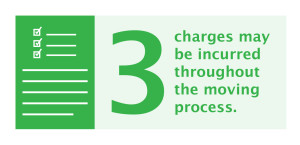Moving is challenging enough between managing schedules, family needs, packing and other logistical details without adding a vocabulary barrier. Knowing common industry terminology can help you understand your moving contract, avoid incurring additional charges, and ensure you’ve booked all the services that you need.

Thinking about making a local or long-distance move?
If a local or long-distance move is in your future – we’re here to help. To spare you the headache of memorizing a whole new language, we’ve picked some essential terms to know before booking your moving company.
Accessorial, Advanced, and Actual Charges

These are three charges that may be incurred throughout the moving process:
- Accessorial charges refer to charges for additional services not included in the basic transportation of goods. These may include packing and unpacking, or specialized delivery outside of typical hours.
- Advanced charges include services scheduled by the moving company that are rendered by third parties at your request. Examples include asking your moving company to hire a specialty piano mover or an appliance installation contractor. These charges are initially paid for by the moving company and are then added to the final bill (see “Bill of Lading” below).
- Actual charges outline the final charges once all services and discounts have been assessed. They represent the full amount the client will pay.
Bill of Lading
The Bill of Lading is the final receipt for everything in the moving process, including any accessorial and advanced charges along with the standard transportation services. Since this document functions as the “contract receipt” for your moving process, it’s critical to make sure it is completely accurate before signing it, and that you receive and retain a copy for your records.
Valuation & Insurance
Per Federal law, these are the two types of liability options interstate movers must offer to their customers:
- Released Value Protection is available at no additional charge and offers base-level insurance. Released Value Protection covers your possessions according to the weight of the item(s) at 60 cents per pound per article. This means that if your $1,200 five-pound laptop were damaged, it would be valued at $3.00 (60 cents x 5 pounds).
- Full Value Protection is a comprehensive plan that holds your mover liable for the replacement value of any lost or damaged items that were part of your shipment. It must be purchased from a third-party provider well before your move and requires an inventory of your belongings. Customers are advised to check what items are included in Full Value Protection policies prior to signing moving agreements.
Insurance is a must for any local or long-distance move. All Service Moving offers Released Value Protection, Full Value Protection and Replacement Cost Protection options. Learn more about these options to understand how homeowner’s and renter’s insurance may apply to your move from our insurance overview.
AMSA Certified Mover
Established in 1936, the American Moving and Storage Association (AMSA) is a nonprofit trade association representing all aspects of the moving industry. AMSA-certified companies specialize in interstate household moves and are screened and vetted to ensure they meet all insurance and licensing requirements. AMSA’s ProMover program also offers consumers a variety of resources such as the ability to search for certified movers in their area, moving tips and more.
All Service Moving is proud to be an AMSA-certified ProMover company. We invite you to learn more about our membership associations and awards.
Storage-in-Transit
Storage-in-Transit (SIT), refers to the process of storing goods during the moving process. SIT may be required if the destination is not ready to receive goods (such as an apartment or office that has not yet been vacated), or if the mover is required to delay the process for logistical or other reasons. This is especially common during long-distance moves, when travel schedules and coordination may take more time than initially anticipated. Goods are traditionally stored in a warehouse until ready to be transported. Our companies in Oregon and Washington provide climate controlled, secure storage space for our customers.
USDOT Numbers
These are official, government designated numbers that serve as registration for vehicles that transport goods across state boundaries. The US Department of Transportation is the chief regulator of these numbers in conjunction with the Federal Motor Carrier Safety Administration. All movers are required to have designated USDOT numbers in order to complete moves across state boundaries.
Proper licensure means the moving company is legitimate, owners and employees have passed criminal background checks, and the company is compliant with Department of Transportation consumer protection and safety requirements.
Consumers should be wary of using unlicensed moving companies that may not be insured. Lack of insurance and/or licensure makes it difficult to hold them legally accountable for damages, theft, or loss. Current USDOT registration numbers can be checked at anytime.
Learn more about how and why to vet your moving company.
Contact Our Moving Companies in Oregon & Washington
Whether you’re looking to move your home or business, locally or across the country, All Service Moving’s reliable professionals will help you make the transition seamlessly.
Headquartered in the Pacific Northwest, All Service Moving is the full-service company of choice for residential and commercial moves throughout the region. Our expert sales agents can answer your questions and guide you through planning and booking your move. Contact the pros at All Service Moving for renowned top-tier moving services!
Licensed & Insured: USDOT# 1863079, ODOT# 119893, WA# HG064752
